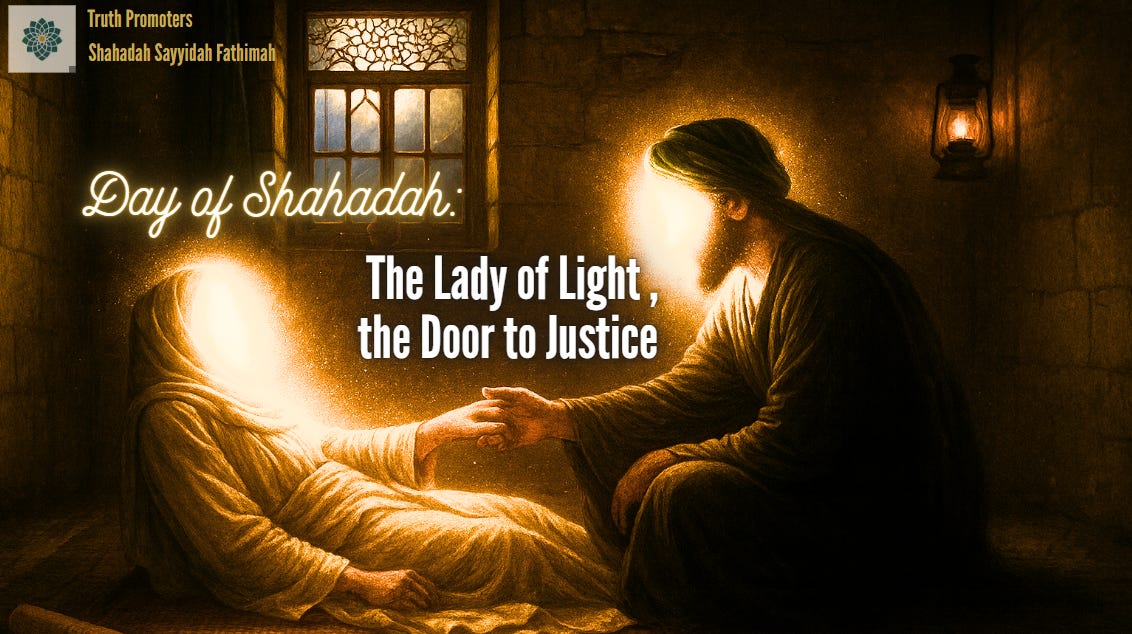Day of Shahadah: The Lady of Light and the Door to Justice
The concluding program centres on a special maqtal that revisits Zahra’s final days and the ethical responsibilities they inspire.
GLOBAL, PUREWILAYAH.COM —Truth Promoters held the concluding Fatimiyyah majlis on Tuesday, 25 November 2025, corresponding to 3 Jumadil Akhir 1447, marking the martyrdom day of Sayyedah Fatimah al-Zahra (sa) with a evening program broadcast live on YouTube. The gathering followed three consecutive night sessions and served as the spiritual and thematic culmination of this year’s Fatimiyyah commemorations.
The program opened with the adhaan, followed by a Qur’anic recitation featuring verses selected to honour the legacy of the Prophet’s daughter. The recitation set a reflective tone for what organisers described as the most significant session of the series.
Final Days of Sayyedah Zahra and Their Enduring Meaning
The central feature of the event was a special presentation of “The Maqtal of Sayyedah Fatimah al-Zahra: The Lady of Light Who Became the Door to Justice,” a devotional narrative delivered in the imagined voice of Imam Mahdi (aj). Rather than recounting biography alone, the maqtal cast Fatimah’s suffering as the primordial wound that shaped the moral trajectory of Islamic history.
The text depicted the final months of her life with stark moral clarity: while Imam Ali (as) washed the Prophet’s body in tears, political leaders gathered in Saqifah to decide succession.
The narrative described the assault on her home, where the door of Revelation—once opened to Gabriel—became the instrument that crushed her between wood and wall, resulting in broken ribs and the miscarriage of her unborn son, Mohsin. The confiscation of Fadak and her landmark sermon in the mosque were framed not as political disputes, but as deliberate tests of how much injustice the family of the Prophet could be forced to endure.
The maqtal presented Sayyidah Fatimah’s final days in Bayt al-Huzn, the House of Sorrow, where she sought solace beside the Prophet’s grave and prepared her own burial shroud. Her request to be buried at night—away from those who had wronged her—was portrayed as a permanent indictment of history, her hidden grave standing as testimony to the moral rupture that followed the Prophet’s death.
One of the text’s most prominent themes was its effort to connect the suffering of Sayyidah Fatimah al-Zahra to the moral challenges of the present age. Speaking in the imagined voice of the Hidden Imam, the maqtal reflected on how moments of silence or inaction in the face of injustice can echo the early wounds of Islamic history.
It invoked contemporary crises in places such as Gaza, Yemen, and Kashmir as reminders that moral responsibility remains a living, ongoing duty. The narrative suggested that every mother enduring hardship in these regions carries a reflection of Zahra’s dignity and resilience, and that genuine devotion to her example entails upholding justice wherever it is threatened.
The maqtal concluded by inviting believers to reflect on their own position in times of trial, asking where each individual chooses to stand whenever a home, community, or principle reminiscent of “the house of Zahra” is placed under strain.
Elegies of Devotion: “Garden of Zahra”
The program continued with a noha titled “Garden of Zahra” by Abdullah Al Mukhliss, a poetic elegy portraying Sayyidah Zahra as the spiritual centre of the struggle between divine justice and oppressive forces throughout history.
Linking pre-Islamic brutality, the persecution of the Ahlulbayt, and the martyrdom of Imam Husayn, the poem depicted Sayyidah Fatimah’s “garden” as a sacred orchard whose blossoms are her martyred sons—culminating in Karbala and extending to the final victory of the Mahdi.
The Communion
To conclude the majlis, organisers recited “The Communion of Sayyedah Fatimah al-Zahra: Through the Daughter of Mercy to the Source of All Mercy.” Although previously recited during the nightly programs, its repetition on the day of shahadah was intended as a spiritual renewal.
The text tied the broken home of Fatimah, the martyrdom of Mohsin, and the awaited rise of justice to modern moral crises, urging participants to renew their covenant to protect the vulnerable and uphold the sanctity of the home.
Multilingual Access Through Hyder AI
As part of Truth Promoters’ ongoing collaboration with Hyder AI, all lectures delivered by Sheikh Shabbir Hassanally, including the full Fatimiyyah series, are now available in multiple languages for global audiences.
🔗 Multilingual lectures: https://www.hyder.ai/en/scholar/56
The final Fatimiyyah gathering closed with prayers for justice, unity, and the emergence of the promised Imam—underscoring the program’s central message that mourning Sayyidah Fatimah must transform into a commitment to resist oppression wherever it emerges. (PW)




